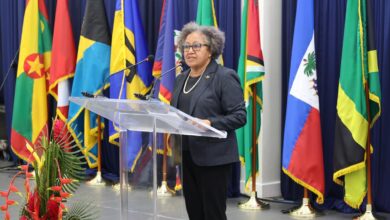(CARICOM Secretariat, Turkeyen, Greater Georgetown, Guyana) The Caribbean Community (CARICOM) Secretariat on Thursday unveiled a campaign to promote the Region’s collective position on climate change, ahead of the 15th Conference of Parties (COP15) of the United Nations Framework Convention on Climate Change (UNFCCC) in Copenhagen, Denmark, 7-18 December, 2009.
Underpinned by the theme “1.5°C to Stay Alive”, the campaign is intended to support and dramatize a common regional approach for mitigating the effects of climate change on the Region, which it will articulate at Copenhagen as well as at the upcoming Commonwealth Heads of Government Conference, November 27-29, 2009, Trinidad and Tobago.
This strategy includes a digital display to vividly illustrate the harmful effects of rising green house gases on the small island states; a documentary entitled, “The Burning Agenda: The Climate Change Crisis in the Caribbean”; and several video presentations on the how climate change has been affecting human, animal and plant life within the Region.
In his remarks, His Excellency Edwin Carrington, CARICOM Secretary-General said the common regional approach for mitigation of climate change to avoid its unmanageable consequences was based on studies coordinated by the Caribbean Community Centre for Climate Change (CCCCC), which concluded that global average temperatures which exceeded 1.5 degrees centigrade would have devastating effects on the Region.
Among the harmful effects, he said, would be significant destruction of coral reefs, coastal barriers, and marine ecosystems, as well as excessive flooding and more intense hurricanes.
“It will erode much of the foundation of our tourism, our agriculture and our fisheries industry; it will wreak havoc on our plant-life, our forests and most of all dislocate our people. Immediate corrective action must therefore be taken if we are to avoid this widespread destruction” Secretary-General Carrington stated.
Director of the Sustainable Development Programme within the CARICOM Secretariat, Mr. Garfield Barnwell stated that the theme which underpinned the campaign “1.5 to stay alive” was “key to our survival in the Caribbean”.
He recalled CARICOM Heads of Government’s decision on a regional approach on Climate Change which is articulated in the Liliendaal Declaration on Climate Change and Development issued last July by the Conference of Heads of Government following their 30th Meeting and which advocates for:-
“… global average surface temperature increases to be limited to well below 1.5° C of pre-industrial levels; that global greenhouse gas emissions should peak by 2015; global CO2 reductions of at least 45 percent by 2020 and reducing greenhouse gas emissions by more than 95 per cent of 1990 CO2 levels by 2050 …”
“The time for action on climate change is now,” the Mr. Barnwell stated. “How nations and their people come together to tackle this unprecedented challenge was likely to become a defining feature of our time, affecting the lives of the current and future generations,” he added.
Secretary-General Carrington noted that the recent signing of a memorandum of understanding between Guyana and Norway on a low carbon development programme, which provided incentives to Guyana for the preservation of its forest, was a “significant signal to the rest of the world of the type of collaboration between developed and developing countries that could make a difference.”
In addition, he said that Brazil’s announcement of its commitment to a low density emissions programme by 2020, illustrated the kind of initiatives that were likely to “push” the Parties at Copenhagen to achieve “positive and mutually beneficial outcomes” for both developed and developing countries.
“It is only with this type of solidarity that CARICOM can carry a strong and unyielding shared vision that could make Copenhagen a landmark for reversing the ill effects of Climate Change. The future generation deserves no less; to delay is to gamble with the very future of mankind,” Mr. Carrington said.
He stated that the Region would seek to consolidate its position within the Alliance of Small Island Developing States (SIDS), the Group of 77 and China, as well as with the Developed or Annex 1 Countries.





